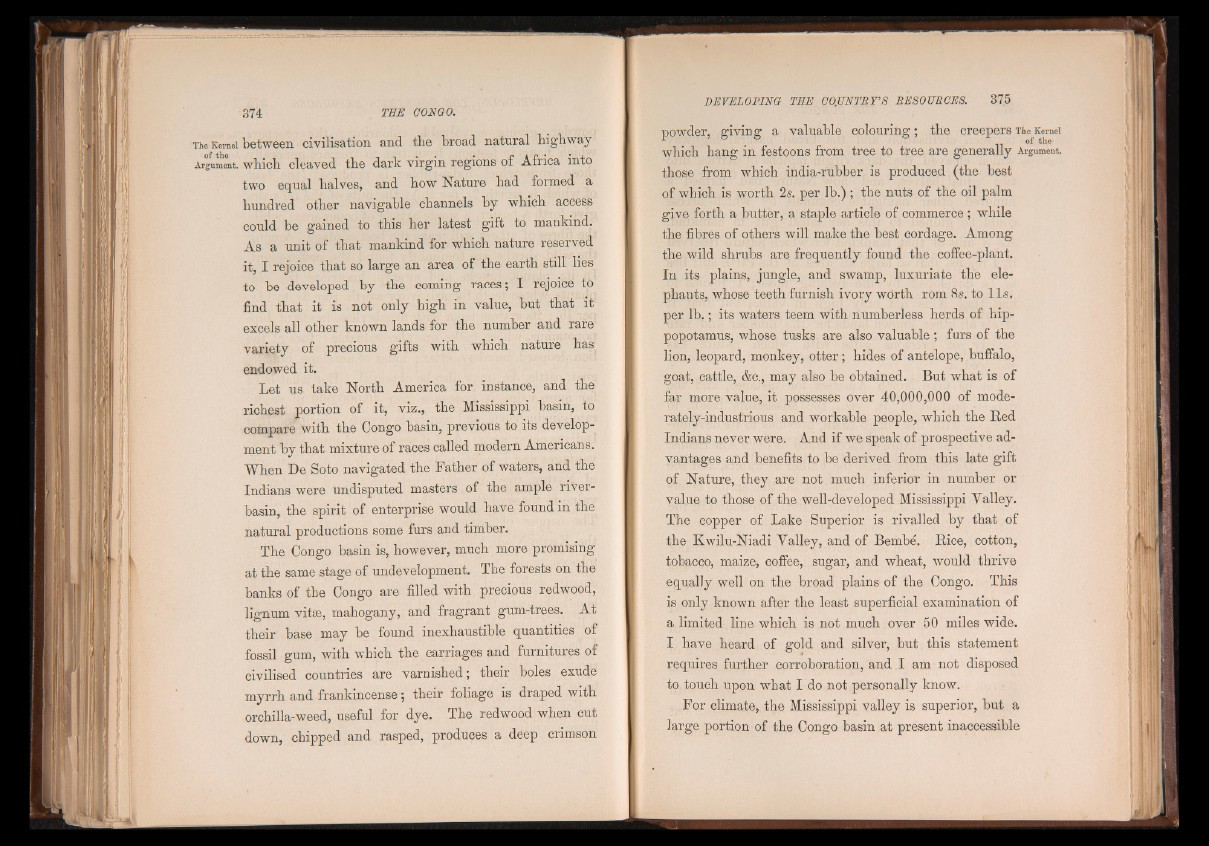
The Kemei between civilisation and the broad natural highway
Argument, which cleaved the dark virgin regions of Africa into
two equal halves, and how Nature had formed a
hundred other navigable channels by which access
could he gained to this her latest gift to mankind.
As a unit of that mankind for which nature reserved
it, I rejoice that so large an area of the earth still lies
to be developed by the coming races; I rejoice to
find that it is not only high in value, hut that it
excels all other known lands for the number and rare
variety of precious gifts with which nature has
endowed it.
Let us take North America for instance, and the
richest portion of it, viz., the Mississippi basin, to
compare with the Congo basin, previous to its development
by that mixture of races called modern Americans.
When De Soto navigated the Father of waters, and the
Indians were undisputed masters of the ample river-
basin, the spirit of enterprise would have found in the
natural productions some furs and timber.
The Congo basin is, however, much more promising
at the same stage of undevelopment. The forests on the
banks of the Congo are filled with precious redwood,
lignum vitae, mahogany, and fragrant gum-trees. At
their base may be found inexhaustible quantities of
fossil gum, with which the carriages and furnitures of
civilised countries are varnished; their boles exude
myrrh and frankincense; their foliage is draped with
orchilla-weed, useful for dye. The redwood when cut
down, chipped and rasped, produces a deep crimson
powder, giving a valuable colouring; the creepers Tke Kernel
of the
which hang in festoons from tree to tree are generally Argument,
those from which india-rubber is produced (the best
of which is worth 2s. per lb.) ; the nuts of the oil palm
give forth a butter, a staple article of commerce ; while
the fibres of others will make the best cordage. Among
the wild shrubs are frequently found the coffee-plant.
In its plains, jungle, and swamp, luxuriate the elephants,
whose teeth furnish ivory worth rom 8s. to 11s.
per lb .; its waters teem with numberless herds of hippopotamus,
whose tusks are also valuable ; furs of the
lion, leopard, monkey, otter; hides of antelope, buffalo,
goat, cattle, &c., may also be obtained. But what is of
far more value, it possesses over 40,000,000 of mode-
rately-industrious and workable people, which the Red
Indians never were. And if we speak of prospective advantages
and benefits to be derived from this late gift
of Nature, they are not much inferior in number or
value to those of the well-developed Mississippi Yalley.
The copper of Lake Superior is rivalled by that of
the Kwilu-Niadi Yalley, and of Bembe. Rice, cotton,
tobacco, maize, coffee, sugar, and wheat, would thrive
equally well on the broad plains of the Congo. This
is only known after the least superficial examination of
a limited line, which is not much over 50 miles wide.
I have heard of gold and silver, but this statement
requires further corroboration, and I am not disposed
to touch upon what I do not personally know.
For climate, the Mississippi valley is superior, but a
large portion of the Congo basin at present inaccessible